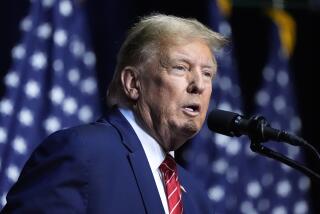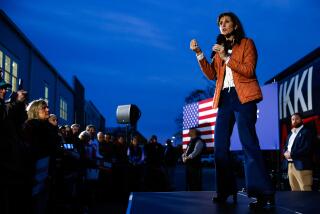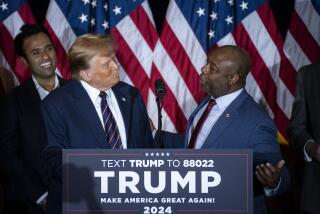Mitt Romney is ready to run a very different presidential campaign
Mitt Romney formally kicks off his presidential candidacy Thursday as the nominal Republican front-runner, hoping that persistent questions about his beliefs and his record are swamped by overwhelming anxiety about the economy.
Romney has tinkered stylistically with the approach that came up short in the 2008 campaign. He’s kept the tailored suits and fancy ties in the closet, politicking in open-necked shirts and low-rise Levi’s slim jeans. He’s even sent out, via Twitter, photographic evidence that his perfectly coiffed hair sometimes gets mussed.
The former Massachusetts governor has also pared back his entourage and avoided the unforced errors that muddled the message of his first presidential try.
But ultimately his campaign rests on Republicans shaking off their concerns about his past positions and his Mormon faith and seizing on him as an economic messenger.
“His biggest challenge has always been, ‘Who is Mitt Romney?’ There’s always been that lingering doubt among conservatives: What does he really stand for? But if there’s a year in which that might not be such a liability for him, it’s this one. This is going to be an economic election,” said Republican consultant Warren Tompkins, who worked for Romney in 2008 but is uncommitted this time.
Romney as economic messenger is no sure thing. He is attacking President Obama for leaving millions of people out of work, but Democrats counter that Romney presided over layoffs and bankruptcies at companies he acquired as a corporate turnaround specialist, charges that undermined his first run for office in Massachusetts in 1994.
Still, the economy remains the best angle for a candidate whose other attributes have angered his fellow Republicans.
Saul Anuzis, a former Michigan Republican Party chairman who is neutral in the 2012 race, said the jobs issue was “a two-edged sword” for Romney: While it “clearly can be” used by and against him in the general election, it is “almost a nonissue in the primaries,” where one of the ideas that unites Republicans is slashing the federal government — which means layoffs.
Romney’s Mormonism was thought to be a vulnerability in 2008, particularly with evangelical Christians. Social conservatives cast two of every five Republican votes, and it didn’t help that Romney had once taken liberal positions — since abandoned — on issues such as abortion and gay rights.
Today, “Romney’s got four more years of being pro-life, and four more years of campaigning under his belt,” said Richard Land, a prominent social conservative, who doesn’t see religion as a “deal killer.”
But Romney’s role in forging a Massachusetts healthcare plan could be. The law requires virtually everyone in the state to have medical insurance, a government mandate that served as a model for the law Obama and the Democrats enacted last year. Repealing or outlawing “Obamacare” is a priority for Republicans and for Romney, who criticizes it on states-rights grounds, even as he defends the Massachusetts law as a success.
“His biggest problem isn’t Mormonism,” said Land, president of the public policy arm of the Southern Baptist Convention, the nation’s largest evangelical denomination. “It’s ‘Romneycare,’ because evangelicals are implacably opposed to ‘Obamacare.’ They loathe and detest it.”
National polling puts Romney at the head of the Republican field, historically the best place to be in a party that values hierarchy and normally promotes the next man in line. And he has assembled the most extensive fundraising network of any Republican candidate and has seasoned advisors at his side.
But Romney hasn’t inherited the mantle the way a sitting vice president or Senate leader would, and his skills as a candidate remain suspect. The Gallup organization, in a recent analysis, called him “arguably the weakest front-runner in any recent Republican nomination campaign.”
After being criticized as mechanical and scripted in 2008, he has sought to connect with voters emotionally. But his recent use of a PowerPoint slide presentation to defend his healthcare plan was criticized as a sign that he hasn’t yet figured out how to bond.
Rival campaign strategists credit Romney and his advisors for staying in touch with supporters and party politicians since the last campaign. They praise his disciplined approach, which has included almost no interviews with print publications and infrequent public events — all designed to limit mistakes and give critics fewer opportunities to point out his shortcomings.
“He is somebody who will have a lot of resources and will be competitive for a long time because of the money he has,” said David Carney, a GOP consultant who advises rival contender Newt Gingrich and potential candidate Rick Perry, the Texas governor. “When voters are paying more attention this fall, that’s when Romney will engage. They’re doing a very good front-runner strategy.”
The richest man in the 2012 race, with personal wealth measured in the hundreds of millions of dollars, Romney has already banked millions in campaign donations for what could be a prolonged nomination fight and, if successful, a challenge to an incumbent president expected to raise as much as $1 billion.
Accompanied by only two traveling aides, Romney flew commercial to Iowa for a recent campaign swing. There, he boasted that his announcement ceremony, a chili cookout on a New Hampshire farm, wouldn’t be followed by a five-state fly-around in a chartered jet, like the last one was.
“These are lean times for a lot of Americans,” Romney said, “and if you want to run a smart campaign, I think you have to be lean as well.”
More to Read
Start your day right
Sign up for Essential California for news, features and recommendations from the L.A. Times and beyond in your inbox six days a week.
You may occasionally receive promotional content from the Los Angeles Times.






